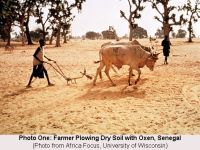West Africa: Green farming, greater yield
West Africa sets the stage for the latest project launched by the UN's Food and Agriculture Organization, building diversified farming systems. Over 100.000 farmers are taking part in this scheme in Benin, Burkina Faso, Mali and Senegal and it could be widened to cover half a million families over the next five years if 40 million USD can be found.
 The new project is a community-based farming programme, in which small groups called Farmer Field Schools promote good farming practices, reducing the use of toxic pesticides, while conducting experiments in the field and passing on the knowledge to the wider farming community.
The new project is a community-based farming programme, in which small groups called Farmer Field Schools promote good farming practices, reducing the use of toxic pesticides, while conducting experiments in the field and passing on the knowledge to the wider farming community.
FAO Senior Technical officer William Settle declares that these experiments by the Farmer Field Schools "give smallholder farmers the means to produce in a more environmentally-friendly way, to substantially increase yields and earn a better income".
How does the project work?
A trainer prepares a small group of around 25 farmers using two training plots in their village. One group uses conventional methods, as a control group, and the other group uses the best practices which are considered most adequate for the type of harvest and the location. Then they make comparisons between the results on both plots.
The best practices examine soil improvement policies, alternatives to chemical pesticides, marketing and food safety. FAO has stated that the scheme could be widened to include 500,000 farmers over the next five years at a cost of 30 to 40 million USD.
The project comes after years of intensive use of highly toxic pesticides, due to a generalised misunderstanding of the full impact of these products on the environment, economy, production and the health of the communities.
Source: UNO
Timothy Bancroft-Hinchey
Pravda.Ru
Subscribe to Pravda.Ru Telegram channel, Facebook, RSS!





